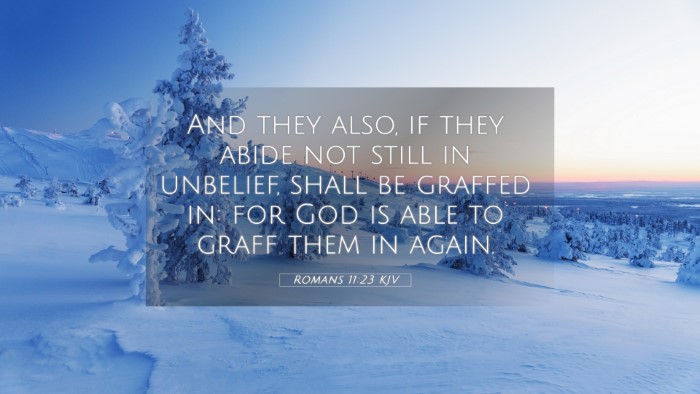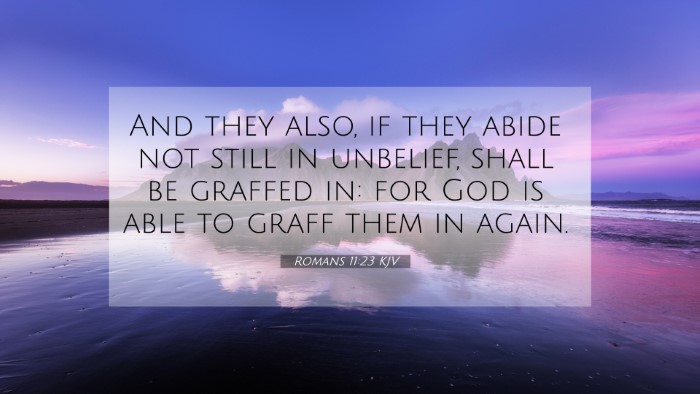Understanding Romans 11:23
Bible Verse: Romans 11:23 - "And even they, if they abide not still in unbelief, shall be grafted in: for God is able to graft them in again."
Summary of Meaning
This verse conveys a profound message of hope and redemption, particularly regarding the Jewish people. The Apostle Paul, in his discussion on salvation and grace, emphasizes God's ability to restore those who have turned away from faith. Paul uses the metaphor of grafting, which alludes to the agricultural practice of joining a new plant to the root system of another, illustrating how God can reintroduce those who have previously been disobedient back into the fold of His grace.
Commentary Insights
-
Matthew Henry:
Henry emphasizes God's mercy and the certainty of restoration for those who turn back from their unbelief. He highlights that God's ability to graft the Jews back into His covenant indicates not only His power but also His willingness to extend grace. This reflects the depths of God’s infinite grace for all, regardless of past disobedience.
-
Albert Barnes:
Barnes explains that this verse teaches about the fate of Israel and the Gentiles. He notes that while Israel has faced consequences for their unbelief, this does not result in their final rejection. Instead, there exists the possibility of restoration, showcasing God's unchanging promises and the hope that remains for Israel.
-
Adam Clarke:
Clarke discusses the concept of grafting and its implications for both the Jews and Gentiles. He points out that the metaphor serves to illustrate the unity of believers in Christ, stressing the importance of faith as the unifying factor that God desires. Clarke also emphasizes the necessity of faithfulness in maintaining one’s relationship with God.
Bible Verse Cross-References
To fully grasp the richness of Romans 11:23, consider the following cross-references:
- John 15:1-2 - The vine and branches analogy, emphasizing the need for belief and connection to God.
- Ephesians 2:12-13 - Illustrates how Gentiles are brought near through Christ, paralleling Israel's opportunity for restoration.
- Isaiah 11:1 - A prophecy concerning the Messiah, echoing themes of hope for Israel.
- Jeremiah 31:31-34 - Discusses the new covenant that reaffirms God's relationship with His people.
- Romans 11:1-2 - Paul questions whether God has rejected His people, reinforcing hope for Israel's future.
- Hebrews 6:4-6 - Addresses the seriousness of turning away from faith and the chance for restoration.
- Luke 15:4-7 - The parable of the lost sheep, showcasing God's joy in restoring those who return to Him.
Thematic Bible Verse Connections
In examining Romans 11:23, one can discover connections between various themes throughout the Scriptures:
- Grace and Redemption: The recurring motif of God's grace extends to all who turn to Him, highlighted in both Testaments.
- Faithfulness: The importance of maintaining faith is underscored by various biblical characters who strayed but were welcomed back.
- The Nature of God: God's unchanging nature is a central theme, providing assurance of His promises.
Tools for Bible Cross-Referencing
Theological study benefits greatly from tools designed for cross-referencing:
- Bible Concordance: A resource that allows users to locate and explore words and their occurrences across Scriptures.
- Bible Cross-Reference Guide: A tool that assists in identifying passages that relate to specific themes, enhancing understanding.
- Cohesive Bible Study Methods: Approaches to studying the Bible that emphasize the interconnectedness of Scriptural passages.
Conclusion
Romans 11:23 serves as a beacon of hope, reaffirming that God's grace extends even to those who falter in faith. The use of the grafting metaphor and connections to other scriptural themes exemplify the deep interwoven narratives of redemption throughout the Bible. By understanding the layers of meaning within this verse and cross-referencing related scriptures, believers can grasp the extensive action of grace in both the Old and New Testament contexts.





